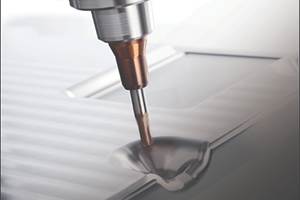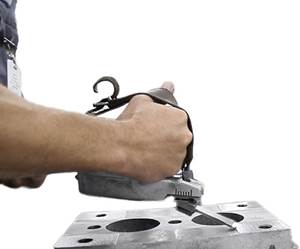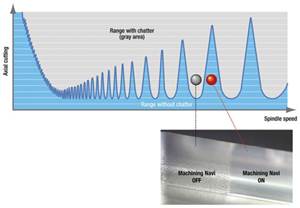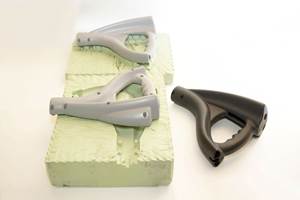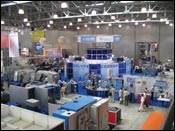Shrink Fit: The High Accuracy Toolholder of Choice
Requirements in the mold industry are much more precise than general machining, so more attention must be paid toward the selection of the appropriate toolholder in regards to its features and benefits.
Within the last 10 years, the acceptance and integration of shrink fit toolholders in the mold and die industry has continued in aiding North American-based mold shops in remaining globally competitive.
Toolholding for milling machines in general had often been overlooked by most manufacturing facilities throughout the North America. However, it was the mold and die industry that was really the first segment of the manufacturing market to look for more precise toolholder options. Due to numerous inherent benefits, shrink fit toolholders have predominately become the high accuracy toolholder of choice for the mold and die market.
The Challenge
As the mold and die industry in North America has become much more of a globally competitive market, the need to reduce expensive labor intensive practices has become an absolute necessity for shop owners. The goal for most shops is to reduce or completely eliminate polishing or spotting time on their molds. This can be accomplished in numerous ways including the use of EDM sinker machines, hard milling of steel or cutting closer to net shape from the beginning of the machining process.
In order to address this challenge, the mold and die shops have been forced to look at their entire process. For example, choosing the correct machine tool for the job is no longer the only consideration. It is important to investigate and decide on the appropriate machine control, CAD/CAM software package, toolholders and cutting tools in order to complete the job most efficiently.
The Toolholder Solution
When looking for toolholder solutions for any type of machining, it is always good to first focus on three main features that a toolholder must bring you:
1. Rigidity
Rigidity comes from sufficient taper contact and proper clamping of the toolholder in the machine tool spindle.
2. Accuracy
Accuracy comes from minimal run-out at the cutting edge of the cutting tool.
3. Balance
Balance comes from a balanced assembly of the toolholder (including all accessories such as pull-studs) and cutting tool combination.
However, the requirements in the mold and die industry are much more precise than general machining, so more attention must be made toward the selection of the appropriate toolholder for the job.
For example, a mold shop often must think of the following:
- Geometry of toolholder to avoid collisions with the workpiece. In regards to the EDM process, electrodes must be machined accurately and efficiently. Oftentimes, deep ribs are required in the part process and often present challenges. Also, deep cavities such as large door panel or bumper molds require deep reach with extreme clearances.
- Cleanliness of the toolholder to avoid excessive run-out, especially when machining graphite.
- Extending cutting tool life since high-end cutting tools are needed to obtain the best performance in the shortest time possible. These cutting tools often have exotic coatings that lend to an expensive price.
- Finish. Higher speeds and feeds are used with lower depth-of-cuts, which translates into better surface finishes. This makes balance even more important to minimize vibration at the cutting edge of the cutting tool. Also, proper chip evacuation provides better finishes.
Based on these additional requirements, most mold shops have found that due to some inherent benefits, shrink fit toolholders give them the best opportunity to accomplish the job competitively and accurately. Also, the evolution of inductive shrink fit machines has made the shrinking process easier, quicker, safer and less costly to invest in this technology up front.
Shrink Fit Advantages
There are 10 inherent benefits that a good shrink fit chuck can offer a mold shop:
1. Unsurpassed accuracy
A properly produced shrink fit chuck should be able to guarantee 0.00012" (3 microns) maximum run-out at three times the cutting tool diameter. This accuracy is very repeatable from operator to operator.
2. Availability of slim profiles
Shrink fit chucks are available with three-degree draft angles and very slim profiles. They can also be modified to be straight walled if needed in order to prevent toolholder collision with the workpiece.
3. Gripping torque
A shrink fit chuck grips the cutting tool 360 degrees around the shank. This leads to a very high gripping torque that prevents the cutting tool from moving during roughing or finishing operations. This greatly aids in the reduction of scrapped parts.
4. Extended reach options
Shrink fit chucks can use shrink fit extensions that provide the user with many options with standard products. When machining deep cavities, one can place shrink fit extensions into standard shrink fit chucks, getting unsurpassed toolholder lengths with very little run-out.
5. Balance repeatability and balanceable options
Shrink fit chucks offer the best balance repeatability of any toolholding system on the market since there are no moving parts. In many cases, if a shop purchases a properly balanced shrink fit chuck with correct accessories (such as pull-studs) and uses good cutting tools without inherent unbalance (such as flats) then they can often have good balance characteristics for running at high speeds without doing an additional fine-tune balancing. Of course, if there is a need for additional balancing of the toolholder on a balancing machine after the assembly of the toolholder setup (toolholder plus cutting tool, plus pull-stud or coolant tube) then many shrink fit chucks on the market come with simple to use balanceable options already built into the chucks.
6. Reduction of toolchanging time/less toolholder accessory inventory
Nothing beats the tool change time of shrink fit chucks if the process is joined with a capable inductive shrink fit machine. Tool changes can be done in five to 10 seconds, and most importantly, consistently. This allows the toolholder assembly to be in the machine making chips more of the time, than out of the machine waiting to be changed. Also, a shop needs very little additional toolholder accessory inventory (i.e., collets, nuts, seal disks, etc.). This simplifies the process.
7. Cleanliness of setup
A shrink fit chuck typically is a sealed system by design. Therefore, the introduction of contaminants in the bore are minimized (such as graphite dust or chips). If contaminants are introduced to the bore of a toolholder, oftentimes run-out accuracy is compromised.
8. Coolant options
Shrink fit chucks often have clever methods to deliver coolant or air/oil mist down to the cutting edge of the cutting tool. This helps with the proper removal of chips and can also aid in providing better finishes. In addition, if a mold shop does high precision drilling, a shrink chuck makes an excellent holder for coolant through drills since no accessories or special collets are needed—the sealed design of the toolholder simply allows the coolant to flow through the cutting tool.
9. Consistency of setup
Shrink fit holders provide the best repeatability from toolholder setup to toolholder setup. This is especially beneficial for those shops running lights out. For example, all toolholder setup operators set the toolholders the same with shrink fit holders. There are no variables—such as over-tightening or under-tightening a collet nut or not cleaning out a chuck sufficiently. Also, as mentioned the balance characteristics are the most repeatable. This combination of consistency allows a shop to truly monitor their tool life and understand how many parts they can machine with each toolholder setup—again, this is truly an important part of getting to the point of lights out machining.
10. Availability of shrink chucks
Most of the major toolholder builders in the world now offer shrink fit chucks as a standard. Therefore, mold shops are not roped into proprietary high precision collets or press fit systems that sometimes are only available from one manufacturer.
Selection of the Proper Shrink Fit Chuck
While there are many suppliers of shrink fit chucks available, there are good and bad shrink fit chucks available. It is important to do research related to the selection of a toolholder for your particular application.
Typically, the initial purchase of your toolholders will last the life of your machine tool. Studies have found that the overall expense of toolholders equals less than 0.5 percent of the overall machining process during the life of the machine tool.
The relationship between the bore of the holder and the taper lead to the accuracy of the chuck. It is important to choose a company that truly makes their own product and specializes only in the production of toolholders. This guarantees you the most consistent and accurate toolholder available for your job.
The material of the shrink fit chucks is also a key element in making the correct selection. If a substandard material is used, one might shorten the life of the shrink fit chuck based on limited heating cycles. A shrink fit toolholder made of the correct material should remain effective indefinitely.
Also, it is important that the chucks subscribe to the DIN standards on the nose dimensions so that all cooling options from the shrink fit machine side can be utilized.
In general, it is recommended to purchase chucks with many “options” built-in (such as balanced so that there is under 1 gmm of unbalance in the chuck, balanceable design, bore for the data chip, form “DIN B” coolant delivery option, etc.) so that you are not limited in the future as your operation evolves.
Finally, the company making the chucks should be an industry leader, constantly putting further efforts into research and development into new toolholding concepts that can further strengthen the role of shrink fit toolholders in the mold market.
For example, the recent development of a shrink fit chuck1 that provides an anti-vibration feature in a shrink chuck. This feature helps dampen the vibration during roughing operations that had at one time occurred with standard shrink fit chucks due to the extreme rigidity of the setup.
Summary
It is often stated by shop owners and plant managers that shrink fit tooling has been the best investment they have made in the past five years. Acceptance of the use of shrinking technology in the mold and die market has played a vital role in strengthening North American manufacturing capabilities and preparing it for continued growth.
References
1 Haimer’s Power Shrink fit chuck.
Related Content
Moldmakers Deserve a Total Production Solution
Stability, spindle speed and software are essential consideration for your moldmaking machine tool.
Read MoreThe Benefits of Hand Scraping
Accuracy and flatness are two benefits of hand scraping that help improve machine loop stiffness, workpiece surface finish and component geometry.
Read MoreHow to Eliminate Chatter
Here are techniques commonly used to combat chatter and guidelines to establish a foundation for optimizing the moldmaking process.
Read MorePlastic Prototypes Using Silicone Rubber Molds
How-to, step-by-step instructions that take you from making the master pattern to making the mold and casting the plastic parts.
Read MoreRead Next
Selecting the Best Toolholding Solution for Your Shop
A look at ER collet systems and a review of the properties to look for when making your toolholding purchase decision.
Read MoreHow to Use Continuing Education to Remain Competitive in Moldmaking
Continued training helps moldmakers make tooling decisions and properly use the latest cutting tool to efficiently machine high-quality molds.
Read MoreAre You a Moldmaker Considering 3D Printing? Consider the 3D Printing Workshop at NPE2024
Presentations will cover 3D printing for mold tooling, material innovation, product development, bridge production and full-scale, high-volume additive manufacturing.
Read More
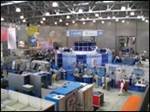


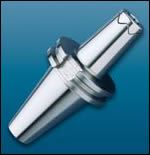
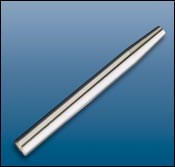
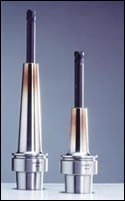
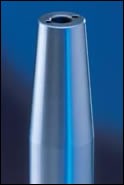
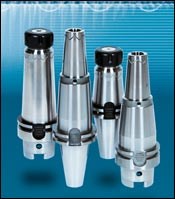





.jpg;maxWidth=300;quality=90)












